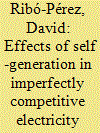| Srl | Item |
| 1 |
ID:
168654


|
|
|
|
|
| Summary/Abstract |
Domestic rooftop photovoltaic (PV) energy can reduce net electricity demand, and therefore reduce energy prices through a merit-order effect. This reduces profits of all incumbents in the electricity markets. In addition, in imperfectly competitive markets, PV self-generation reduces prices through a reduction in market power. The first effect may warrant additional policy interventions to maintain cost recovery, but the second is much more desirable, as it simultaneously helps increase sustainability and competition. However, unlike a simple reduction in market prices, the competition effect affects all incumbents differently. Since resistance from incumbents can be a significant barrier to energy policy change, it is important to understand the distribution of effects. This paper does so for the Spanish market. A Nash-Cournot model and a simplified representation of the Spanish electricity market is used to determine the merit-order and competition effects of an increase in solar self-generation. We conclude that both are important, and that their analysis is essential to inform the social debate around PV policy.
|
|
|
|
|
|
|
|
|
|
|
|
|
|
|
|
| 2 |
ID:
178825


|
|
|
|
|
| Summary/Abstract |
Residential consumers are moving to the center of electricity systems and their flexibility is seen as a key resource to integrate renewable energy sources and support the grid. However, residential flexibility capacities are not homogeneous, as they depend on household appliances, comfort patterns, occupancy, and climate conditions. Here, we calculate the technical flexibility capacities of 45 consumer types in mainland Spain, organised according to income and regional criteria. We show that flexibility gaps exist at both regional and socioeconomic (income) levels with flexibility differences of up to 10 times more capacity between the household groups from the lowest to the highest capacities. These geographical and socioeconomic gaps in flexibility can lead to distortions in national markets and have the potential to exclude citizens from the provision of flexibility services. Our results show in quantitative terms that a consumer-centered approach without considering correcting measures nor these gaps in drafting energy policies may lead to increasing inequality levels in the residential sector. Under an economic competitive paradigm, households with lower income levels or located in regions with lower flexibility potential may be excluded from the provision of flexibility to the detriment of households with larger potential, raising justice concerns in a flexibility-based energy transition.
|
|
|
|
|
|
|
|
|
|
|
|
|
|
|
|